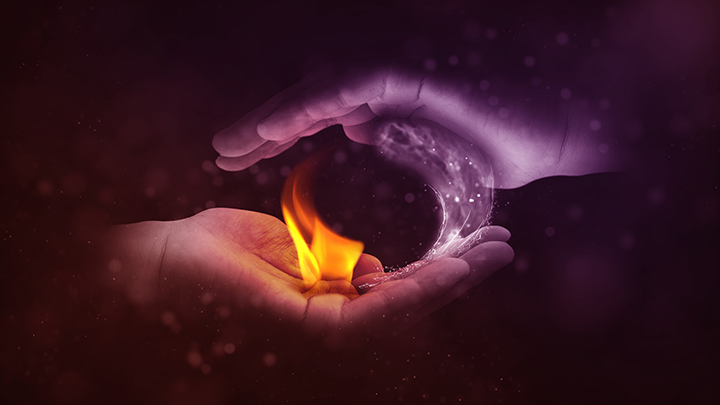Destructive and Dangerous to Ignore Our Shadow Self
If you bring forth what is within you, what you bring forth will save you. If you do not bring forth what is within you, what you do not bring forth will destroy you.
— Jesus, The Gospel of St. Thomas, verse 70
The possibility of the dark side taking over and becoming dominant in an individual is more prevalent and common in those who do not take the time to question themselves and really evaluate their behavior in daily interactions with others. People who are overly identified with how “good” they are can be the most vulnerable because they are so lopsided. No one can be good all the time. It’s humanly impossible. As Carl Jung explains it, it’s actually dangerous.
For example, we’ve all heard stories or read in the newspapers about a person who has murdered several people or committed some atrocious crime that was uncharacteristic of him or her. The people who knew them say, “He or she was such a good person in the community! He was the valedictorian in high school, or she was a very loving member of our church.” No one who knew them in their daily life would have thought them capable of their unexplainable crime. The individual has repressed their dark side so much that their own unconscious overwhelmed them. Without awareness of this dynamic, they express something out of the ordinary precisely because they have denied and suppressed their dark side for so long. We’re actually more vulnerable to our shadow if we don’t know about it. Our shadow becomes a hostile force only when it is ignored or misunderstood.
Flipping from one extreme to its opposite is something Jung called enantiodromia. He learned the term from the philosopher Heraclitis, who described it as “running contrariwise.” In simple terms, it means that psychologically, when an individual goes too far in any one direction in their behavior or character, eventually they will flip and display in their behavior the exact opposite.
A common and well-known example is the devout Christian who is pro-life but flips to their other side and is charged with murdering a doctor they consider to be an abortionist. They have committed murder themselves, but they can’t see that they have done the same thing they are fighting against.
Another well-known example is the powerful evangelist preacher Jimmy Swaggart, condemning unmarried sex from the pulpit, while being caught with prostitutes. Any character trait we are overly identified with is subject to an experience of enantiodromia. We are actually more in touch with our wholeness when there is a healthy balance of light and dark in our character providing us with a resistance to becoming lopsided in one extreme or another.
Jung also said that we do not always know what the unconscious is planning. Sometimes this “flipping” becomes necessary in order to straighten a person out. A person will do one extreme, then flip and do the other extreme before they can balance out and come to the middle. In the end, the unconscious is striving for our wholeness and will bring it about in any way that it can. As I said in the previous publication, sometimes, that can mean we will go through some kind of outer-world crisis such as an illness, an accident, a job loss or a divorce, that can lead us to the inner world, which provides us a significant opportunity to resolve our problems and heal our splits.
If we are wise, we will start an inner dialogue with our Self (God within) and recognize our imbalances consciously so that we don’t end up a news item reminiscent of the infamous mother Andrea Yates in Texas who drowned all five of her children. Similarly, Mary Winkler, the minister’s wife who shot her husband in the back in Tennessee, said in her trial, “I guess that’s when my ugly came out.”
The case of Andrea Yates describes a conservative, selfless, Christian mother, who lived for and through her mothering role for an extended period of time. In trying to gain an understanding of this tragedy, we wonder if what was happening in her unconscious was the extreme opposite of her outward behavior. From this perspective, we shouldn’t be surprised that she became a victim of her own capacity for evil and blamed her actions on the devil or voices inside her. It was her shadow side that overtook her. When you understand the psychological law of enantiodromia, you will see how this “possession” could have been anticipated by those who knew her had they understood this principle of compensation that Jung described as the self-regulating activity of the psyche.
In the case of Mary Winkler, we can empathize with her difficult situation as most ministers’ wives are expected to be perfect, ideal women, always kind, gracious and charming. God help her if she has an opinion of her own that goes against the grain of conformity or any outward expression resembling anger, selfishness, or resentment. The pressure of always being watched is enormous. It is no wonder that ministers’ wives (or children) cannot live up to this impossible standard 100 percent of the time. The loneliness of these two women must have been unbearable. Mary Winkler’s Minister husband was abusive to her. She finally snapped and killed him.
When we hear stories like this, we can be horrified and repulsed, or we can recognize that there is also a murderer in us quite capable of doing the same thing if we found ourselves in that person’s shoes. It doesn’t mean we condone it. It means we consciously observe unexpressed shadow working in the experience and come to terms with our own malevolent extremes and polarizations. We need to recognize what we are capable of and not project it outward by seeing it only in other people.
Someone who has lived their entire life with a strong tendency to one-sidedness in their character has a greater chance of suffering from an enantiodromia in their psyche. The person overly identified with being a hardworking, responsible person, obsessed with making money can flip and become a lazy, irresponsible wastrel. People will say, “We just don’t know what got into him or her.” Their one-sidedness constellates the opposite. This is what Jung viewed as a great danger in the psyche of man — to become lopsided for too long. What we all need is more balance in our lives.
We need to work hard, and we need to play and take vacations. We need to save money and we need to spend money. We need to give and receive. The act of receiving is another hard one for a lot of people. When we are aware that we are getting lopsided anywhere, we are wise if we do some of the opposite for the sake of our own equilibrium.
Shadow Work is Not about Getting Rid of Anything.
Shadow work is not about finding a characteristic or quality in someone else that you don’t like in yourself and getting rid of it. It is about inclusion, not exclusion.
There is a statement in the Bible, “Be ye therefore perfect, as also your heavenly father is perfect.” [Matt 5:48] In his book AION, the Phenomenology of the Soul, Jung explains that the word “perfect” was transcribed from the Greek word teleios which means “complete.” Jung’s explanation is very different from what we usually understand as perfect. Perfect implies that you are flawless and have somehow achieved a level of mastery. Yet Jung stressed the impossibility of striving for perfection because this would split-off our shadow, and therefore, without our knowing, constellate the opposite in our unconscious.
Jung says, “The individual may strive after perfection but must suffer from the opposite of his intentions for the sake of his completeness.”
We must be willing to suffer an acceptance of our dark side in order to be a whole self and recognize that, try as we may, our faults and flaws will continue to be with us. They are part of every living human being. Edward C. Whitmont put it very well. He said,
“The shadow cannot be eliminated. It is the ever-present dark brother or sister. Whenever we fail to see where it stands, there is likely to be trouble afoot. For then it is certain to be standing behind us. The adequate question therefore never is: Have I a shadow problem? Have I a negative side? But rather: Where does it happen to be right now? When we cannot see it, it is time to beware! And it is helpful to remember Jung’s formulation that a complex is not pathological per se. It becomes pathological only when we assume that we do not have it; because then IT HAS US!”
Asking the Self, God within, our higher power, the force, or the Universe for help in discerning our imbalances is a way to start. I have an agreement I make with my inner being. The agreement goes something like this: If I don’t see something, and it’s important for my well-being to see it, then please show it to me three times, and I promise I will listen. That is a guiding philosophy of mine that has served me well over the years. A second life philosophy is that there are no accidents. I truly believe everything is showing us something that is necessary for us to see.
If we can meet our partners halfway, then we will be doing shadow work with them which will often bring both partners into balance. This is why I call this work ‘a dance.’ It takes two. You need others to see yourself. As the Rev. J. Pittman McGehee says in his book, The Paradox of Love, “I alone must become myself, but I cannot become myself alone.”
Love for others and for ourselves transforms and heals. We need them to show us our projections, and we help each other by being vulnerable and honest in order to take those projections back. Jung says, “Becoming whole is an intrapsychic process which depends essentially on the relation of one individual to another.”Without the mirror others provide us, there is no recognition of our shadow. Jung says:
“The meaning of ‘whole’ or ‘wholeness’ is to make holy or to heal. The descent into the depths will bring healing. It is the way to the total being, to the treasure which suffering mankind is forever seeking, which is hidden in the place guarded by terrible danger. This is the place of primordial unconsciousness and at the same time the place of healing and redemption, because it contains the jewel of wholeness. It is the cave where the dragon of chaos lives and it is also the indestructible city, the magic circle or temenos, the sacred precinct where all the split-off parts of the personality are united.”
When I first started doing shadow work, I remember how sad I felt. It was very painful, almost like a grieving process. It’s definitely not easy to own your shadow, and, as Jung says, it takes time. I felt as if a part of me was dying, the part of me that thought I knew who I was — which was my persona or my mask. I remember feeling a lot of guilt and asking myself what I could have done differently. It was a dark night-of-the-soul experience going into my unconscious for an entire week. I wondered if I would ever feel normal again. Gradually I came out of it and my inner Self said, “You are all of this and you are also the opposite.” As painful as this work is, it’s necessary to our wholeness.
Our ego strength grows in proportion to seeing who we really are and to holding the awareness of our destructive side consciously without acting it out. This in itself is the ever-present challenge: to hold the tension in the psyche of our opposites and not lean too much to either side.
The Taoists called this the path of the middle way. As the Greeks inscribed on the temple at Delphi, “Know thyself” and “Nothing in excess.”These two very wise statements, made long ago, can help us today, but trust me, I am still working on this. It does not happen overnight for anyone. Just know that you are doing the work, and keep on keeping on when you fail or allow yourself to become one extreme or another. Pick yourself up and keep going. At least, you will begin to know when you are out of balance. That in itself is pretty awesome.
An important thing to remember about our ego is that nobody knows what is unconscious. We only know what our ego can tolerate so you actually develop quite a thick skin the more you integrate shadow. As my teacher Pittman once said,“My shadow is as big as the Astrodome.” Integrating shadow is a long, long process because there are times when you say to yourself, “I don’t see that in me. I don’t act like that.” So the unconscious says, “You don’t want to get it with that person? That’s ok. I’m abundant. I’ll just give you another person.”That’s when you know it’s your shadow when it starts repeating. If it’s just one instance, it pushed your buttons; you didn’t like the behavior; you can ask yourself, “Am I doing this behavior anywhere out there that I am not aware of?” And then be alert.
I write in a journal every day so when circumstances like that occur, I can write it down. If I can write it down, then I can remember it. If I just let it go, I won’t remember. That’s why I wrote the work book like a journal. It has places on the sides so that you can write things down that come up. If you are diligent in creating a dialogue with your unconscious, it will help you. If you ignore your unconscious, it ignores you.
It’s a spiritual and sacred task to do this work and Jung believed that this is the only way we can heal the planet. One person at a time. Not by telling everybody who they should be or what they should do. We each need to take responsibility for acknowledging our complete selves, the dark and the light.
In his very interesting book, Evil the Shadow Side of Reality, John A. Sanford who was a Jungian analyst and an Episcopalian priest, titled a chapter Jesus, Paul and the Shadow. He explained why St. Paul misrepresented Christianity and how Jesus was authentic and knew of his shadow and how to deal with it. “He does NOT call upon us to repress the shadow and identify with a persona.”
“Paul’s ethic takes away man’s freedom. When we are told to conform to a standard of goodness imposed upon us by collective authority, and to repress everything from our consciousness that contradicts this, we have lost our freedom; we are no longer expected to be conscious people, responsible for ourselves. But in Jesus’ ethic man is left with the alternatives life poses to him, the problem of his own duality and the necessity for psychological honesty. Growth in consciousness is valued more highly by Jesus than conformity to “goodness.” Freedom is of the highest psychological value, because this alone makes possible the development of consciousness and love. It may well be that this is why we are created with such dual natures, since duality is the precondition of conscious psychological development.”
— John A. Sanford, Evil, the Shadow Side of Reality, paragraph 83
Rebeca Eigen
Rebeca Eigen, an astrologer for 25+ years and author of The Shadow Dance & the Astrological 7th House Workbook specializes in relationships. From every day decisions, to critical life-altering moments, Rebeca shares with you her practical wisdom and guidance for your life’s journey in becoming who you are meant to be.
https://www.shadowdance.com/




